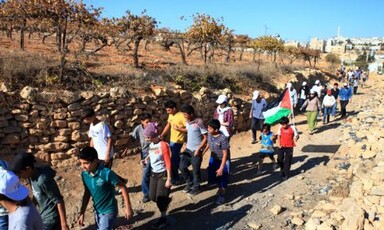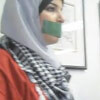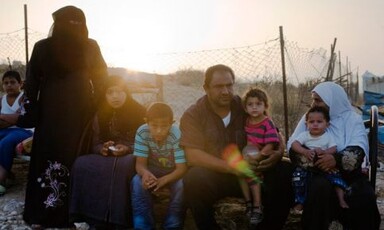
The Carmel wildfire is burning all illusions in Israel
6 December 2010
While the cause of the fire has not been established, it has laid bare the myths of Israel’s foundation. Read more about The Carmel wildfire is burning all illusions in Israel

6 December 2010
While the cause of the fire has not been established, it has laid bare the myths of Israel’s foundation. Read more about The Carmel wildfire is burning all illusions in Israel

7 December 2010
Palestinians in the occupied West Bank village of Beit Ommar are returning to older models of organizing against the Israeli occupation. These organizers are employing strategies of resistance made famous during the first intifada in order to overcome stagnation and division within Palestinian society. Mousa Abu Maria of the Palestine Solidarity Project analyzes. Read more about Beit Ommar returns to its roots

3 December 2010
Students across the US are protesting a public relations campaign that brings soldiers from the Israeli army to speak on campuses. These tours are an attempt to justify recent war crimes committed by the army and are coordinated by various organizations, the most well-known being the Zionist organization StandWithUs. Ahmad Hasan and Danielle Bäck comment. Read more about Why we walked out

1 December 2010
CAIRO, Egypt (IPS) - More than 250,000 classified US diplomatic cables released by online whistle-blower WikiLeaks include statements made behind closed doors that could prove embarrassing for Egypt’s government, say analysts. Read more about WikiLeaks exposes Egypt's duplicity in Gaza siege

30 November 2010
The new WikiLeaks disclosures provide a useful insight, captured in the very ordinariness of the diplomatic correspondence, into Washington’s own sense of the limits on its global role — an insight that was far less apparent in the previous WikiLeaks revelations on the US army’s wars in Afghanistan and Iraq. Jonathan Cook comments. Read more about WikiLeaks' harsh lesson on imperial hubris

24 November 2010
Volvo prides itself on being a byword for sturdiness, safety and reliability. After a careful examination of the vehicle-maker’s investment in Israel, perhaps it should also become synonymous with enabling torture. Read more about Volvo equipment enabling torture, facilitating occupation

24 November 2010
To accuse Hamas of marketing fundamentalism and extremism in the Gaza Strip is false and inaccurate. There is no “Talibanization” of Gaza. Such a claim is based on Israeli propaganda and the deliberately distorted accounts of those in Gaza who are politically and ideologically opposed to the government of Prime Minister Ismail Haniyeh. Ahmed Yousef, Deputy of the Palestinian Ministry of Foreign Affairs, comments for The Electronic Intifada. Read more about There is no "Talibanization" of Gaza

18 November 2010
An elections process in Iraq cleverly diverts all attention from the colossal incompetency of the government, and spins the tall tale of a young, fledgling born-again country instead. The reality is that democracy in Iraq does not exist beyond the show business of sham elections. Ahmed Habeeb comments for The Electronic Intifada. Read more about The deadly lie of democracy in Iraq

18 November 2010
Palestinians describe the Israel Land Administration Law (ILA) quietly passed by the Israeli Knesset in 2009 as the final stage in the 62-year process of displacement from their homeland. The legislation is expected to have a long-term, disastrous impact on Palestinian lives and precludes the possibility of a negotiated resolution to the conflict. Read more about A privatized Nakba

19 November 2010
Director Samuel Maoz’s reduction of Lebanon to the interior of an Israeli military vehicle alerts us to the film Lebanon’s insular vision right away. Belén Fernández comments for The Electronic Intifada. Read more about Cinematic therapy for Israeli soldiers